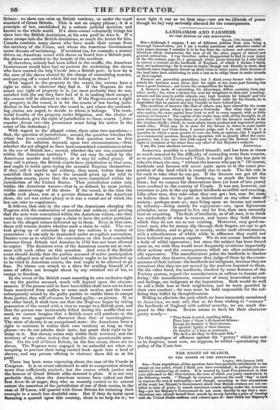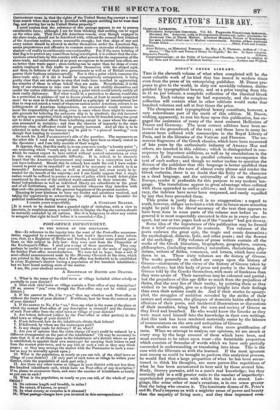THE RIGHT OF SEARCH.
TO THE EDITOR OF THE SPECTATOR.
London, 19th January 1842.
SLR—Your expositions of this question have been perfectly satisfactory to ma except on one point, which I think you have overlooked ; or perhaps you con- sidered it undeserving of notice. It is mooted by Lord PALMERSTON, in that note addressed to Mr. STEVENSON' the tone of which you justly condemned, in the following words. "Though by common parlance the word 'flag' is used to express the test of nationality—and though, according to that acceptation of the word, her Majesty's Government admit that British cruisers are not en- titled in time of peace to search merchant-vessels sailing under the American flag—yet her Majesty's Government do not mean thereby to say that a mer- chantman can exempt herself from search by merely hoisting apiece of bunting with the United States emblems and colours upon it : that which her Majesty's
Government mean is, that the rights of the United States flag exempt a vessel from search when that vessel is provided with papers entitling her to wear that flag, and proving her to be United States property."
I must confess that the substance of this passage appears to me to possess considerable force ; although I am far from thinking that nothing can be urged on the other side. That bond fide American vessels, even though engaged in in the slave-trade, should not be interfered with, without the consent first obtained of the American nation, seems reasonable enough; but that ships of any and every nation should be allowed to shelter themselves under the American flag, seems preposterous and offensive to common sense—a surrender of substance to shadow—of reality to emblematic conventionality. For if the mere hoisting of that flag is to protect any vessel from being interrupted, it is evident that the con- ventions entered into by this country with other powers for the suppression of the slave-trade, and endeavoured at so great an expense to be carried into effect, are no better than waste paper ; since nothing can be easier than for ships of every nation employed in this traffic to provide themselves with the striped zegis, and thus, in defiance of their own governments as well as of British cruisers, pursue their business uninterruptedly. Nor is this a point which concerns the slave-trade only : if it did it would be comparatively unimportant, it being pretty. clear that our attempts to stop that trade have resulted in aggravating the =series of those in whose behalf they are made. Nevertheless, it is the duty of our statesmen to take care that they do not stultify themselves and render the nation ridiculous by conceding a point which would utterly nullify all their costly diplomacy. But what would be a protection to slavers, would also be a protection to pirates—if not to known pirates, at least to merely suspected one's : for as soon as it should be established as a principle of international law that to stop and search a vessel of whatever nation under American colours is an infringement of American independence, no commander would venture to incur the responsibility of so doing, even in cases where there might be reason- able grounds for believing the unknown ship to be piratical ; the risk incurred by acting upon suspicion,which might turn out to be ill-founded, being too great not to deter a prudent officer from interfering except in cases where the suspi- cion amounted to certainty ; and thus the chances of impunity to the most atrocious class of offenders would be greatly increased. And all this is to be tolerated in order that due honour may be paid to "a piece of bunting," even though that bunting be counterfeit I So much for Lord PALMERSTON'S side of the question. The arguments on the other side I need not recapitulate, as they have been so clearly stated in the Spectator; and lam fully sensible of their weight. It appears, then, that this really is, to use your own words," a knotty point " ; one respecting which "much may be said on both sides "; one consequently which we cannot expect to have settled without mutual concessions, or even in this way without considerable difficulty. It is, indeed, to be sincerely hoped that the American Government may consent to a convention such as you have indicated. Should this be refused, how could the evil I have endea- voured to point out be remedied? or would it be necessary to submit to it as incurable ? International law, as well as municipal law, must surely be in- tended for the benefit of the majority; and I can hardly suppose that a single nation would be suffered to pursue a course of policy which would defeat plans considered by the rest of the civilized world essential to their interests. Na- tional independence as well as individual liberty are subordinate to the great end of all institutions, and must be curtailed whenever they interfere with that end—the promotion of the greatest happiness of the greatest number. Trusting to your kindness to have my doubts and questions resolved, and taking the opportunity to acknowledge my obligations to the Spectator for political instruction during several years, I remain yours respectfully, A CONSTANT READER. [It is much to be desired that a guarded right of visitation, with a view to ascertain, in suspicious cases, a vessel's title to display the flag she carries, should be mutually conceded by all nations. But it is dangerous to allow any nation to arrogate that right to itself before it is conceded.—En.)



























 Previous page
Previous page